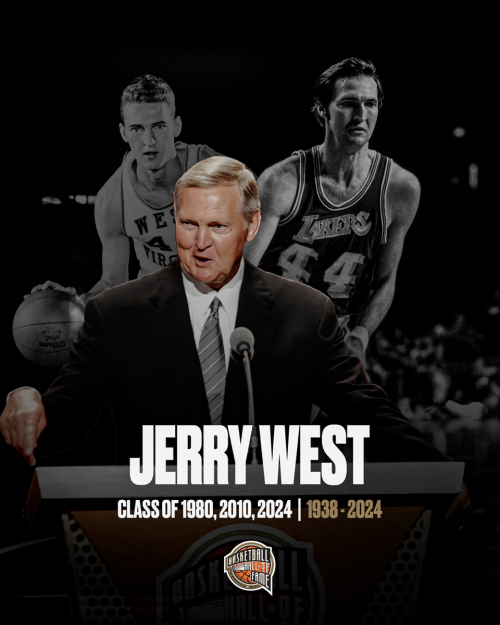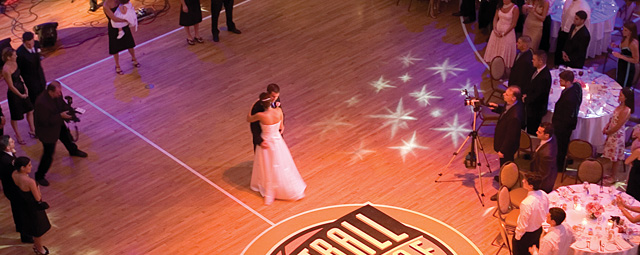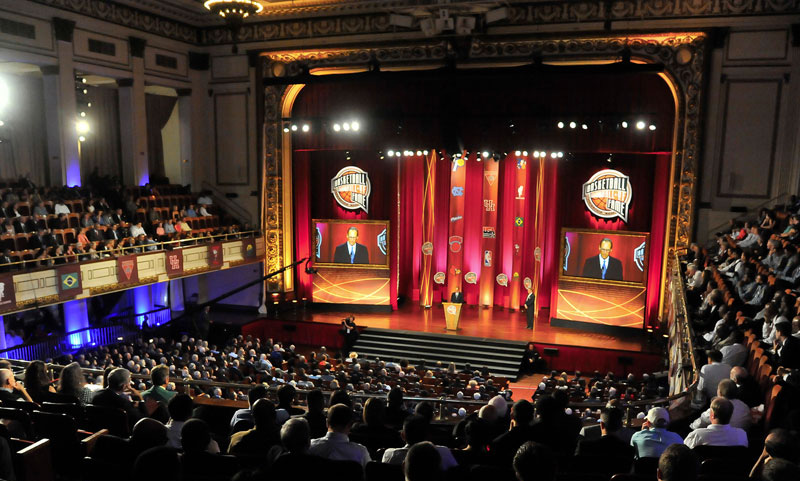In Memory
Jerry West1938-2024Class of 1980, 2010, 2024
Chiseled out of the mountains of West Virginia, Jerome Alan West would carve his name into basketball’s history books. The game’s most complicated stoic, West spent his life sharing the wit, wisdom, and wonder that the game afforded him for more than eight decades.
Jerry West passed away on June 12, 2024. He was 86. West spent his entire life in basketball, first as a standout player and later as a respected executive with several NBA teams including the Los Angeles Lakers and Memphis Grizzlies. The man who would later be known as The Logo earned his keep every day, his unparalleled work ethic always on display whether in the backcourt or in the front office.
John Doleva, President & CEO of the Naismith Basketball Hall of Fame, was visibly shaken when he first learned of the news.
“Jerry West was as impressive a person I have ever met,” Doleva recalled. “His demeanor, and his temperament, commanded respect when he walked into a room. From his college days, to his selection to the 1960 Olympic team, to his time as a player and an executive in Los Angeles and the NBA, Jerry separated himself from the pack at every stop.”
Jerry Colangelo, longtime Chairman of the Naismith Hall of Fame, added:
“Jerry West’s contributions to basketball will carry on forever. The way basketball is played today is a reflection of the innovation and inspiration of West and the Showtime Lakers he helped build. He was always one step ahead of everyone else.”
Born on May 28, 1938 in Chelyan, West Virginia, Jerry West spurned offers from more than 60 colleges and universities to stay close to home to play at West Virginia University. The two-time unanimous First Team All-America led the Mountaineers to the program’s first NCAA Final Four in 1959. West led all scorers and was named Most Outstanding Player. That 1959 Final Four also featured Cincinnati’s Oscar Robertson, a contemporary of West and his toughest rival. The dynamic duo joined forces to lead the United States to the gold medal in the 1960 Olympic Games, forming what might still be the greatest backcourt in history.
On April 11, 1960, the newly-relocated Los Angeles Lakers selected West second overall in the NBA Draft. The Lakers had fallen on hard times since the retirement of George Mikan. Third-year player Elgin Baylor was unstoppable, but he needed a release valve to share the scoring load. In stepped West. In 79 games his rookie season, Mr. Clutch averaged 17 points, 7 rebounds, and 4 assists. The following season, his scoring average ballooned to 30 and the Lakers were back in the hunt for the NBA title. West would have to wait a full decade before celebrating his only NBA championship in 1972, enduring the heartache of eight failed attempts to reach the mountaintop. The losses only fueled the desire of a man born with the heart of a coalminer.
West retired from playing with the Los Angeles Lakers in 1974, his adopted hometown being the only stop of a long and distinguished playing career. In a town where glamour and stardom are monikers of success, the low-key personality of West resonated with the locals. In all, Mr. Clutch enjoyed 14 All-Star seasons, made All-League 17 times, and recorded 25,192 points during the regular season. But the hard-working, high-basketball IQ Jerry West was just getting started.
In 1976, as Lakers play-caller Bill Sharman moved from the sidelines to the front office, West stepped into the role of head coach for the first time. The Lakers won 53 games that season, and even reached the Western Conference Finals. But for West, the self-inflicted pressure of winning or losing was agonizing.
West stepped down, assumed a role as a scout for a few seasons, and then in 1982 he began Act Three of his career as the general manager of the Lakers franchise. Aided by a young Magic Johnson, and a timeless Kareem, West and the Lakers introduced the world to “Showtime.” Three NBA championships soon followed, including back-to-back runs in 1987 and 1988, and a showdown with the Chicago Bulls in 1992 that ultimately passed the torch to a new era. West was the architect of those teams, bringing in complimentary players like Byron Scott, A.C. Green, and Mychal Thompson. Nearly a decade would pass before the Lakers would reach the NBA Finals again.
In the summer of 1996, West set his sights on bringing the NBA’s biggest franchise player to the City of Angels. Shaquille O’Neal, just one season removed from taking the Orlando Magic to the NBA Finals, agreed to a seven-year deal with the Lakers in one of the biggest free agent signings in history. This move followed the bold and daring draft night trade West orchestrated around a high school phenom named Kobe Bryant. These two alpha males, along with West’s uncanny ability to bring in the right fit of role players and glue guys like Derek Fisher, Rick Fox, and Robert Horry, produced the second three-peat in franchise history.
Eventually West would leave the Lakers for the Memphis Grizzlies. In a five-year window, West won his second Executive of the Year award and turned the Grizz into a playoff team. He stepped down again, only to be called back into action as a consultant with the Golden State Warriors and Los Angeles Clippers.
Jerry West was inducted into the Naismith Basketball Hall of Fame with the Class of 1980, 2010, and 2024. West is the namesake for the Jerry West Award presented annually to the nation’s top collegiate shooting guard by the Naismith Basketball Hall of Fame.




